Business Law and Ethics: Case Study on Contractual and Ethical Issues
VerifiedAdded on 2023/06/12
|7
|1892
|252
Case Study
AI Summary
This case study explores several legal issues within a business context. It examines whether Fran can hire Marco instead of Jane, considering the legal implications of their agreement. The analysis applies contract law principles, particularly focusing on the intention to create legal relations as established in cases like Chappell v Nestle and Tweddle v Atkinson. Further, it assesses the applicability of promissory estoppel in Fran's promise to Octavia regarding renting a warehouse, referencing Revenue Commissioners v Moroney. The study also investigates the enforceability of a restraint of trade clause in Fran's employment contract with Dante under the Consumer and Competition Act, drawing from Fogarty v Dickson. Finally, it determines whether Arjun is entitled to free chocolate supply based on a unilateral contract offer, referencing Embourg v Tyler. The study concludes with findings for each issue based on the application of relevant legal principles and case law.
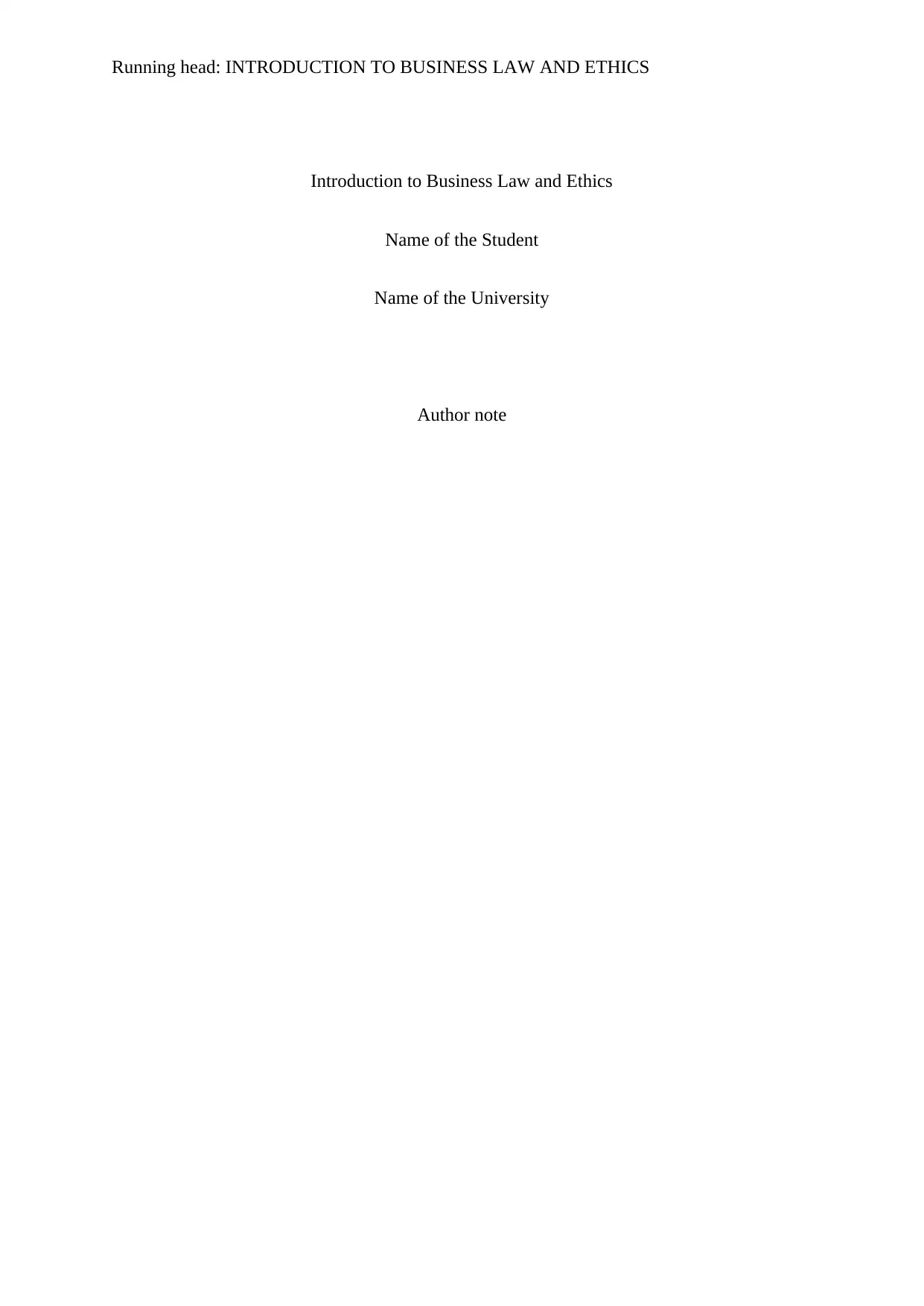
Running head: INTRODUCTION TO BUSINESS LAW AND ETHICS
Introduction to Business Law and Ethics
Name of the Student
Name of the University
Author note
Introduction to Business Law and Ethics
Name of the Student
Name of the University
Author note
Paraphrase This Document
Need a fresh take? Get an instant paraphrase of this document with our AI Paraphraser
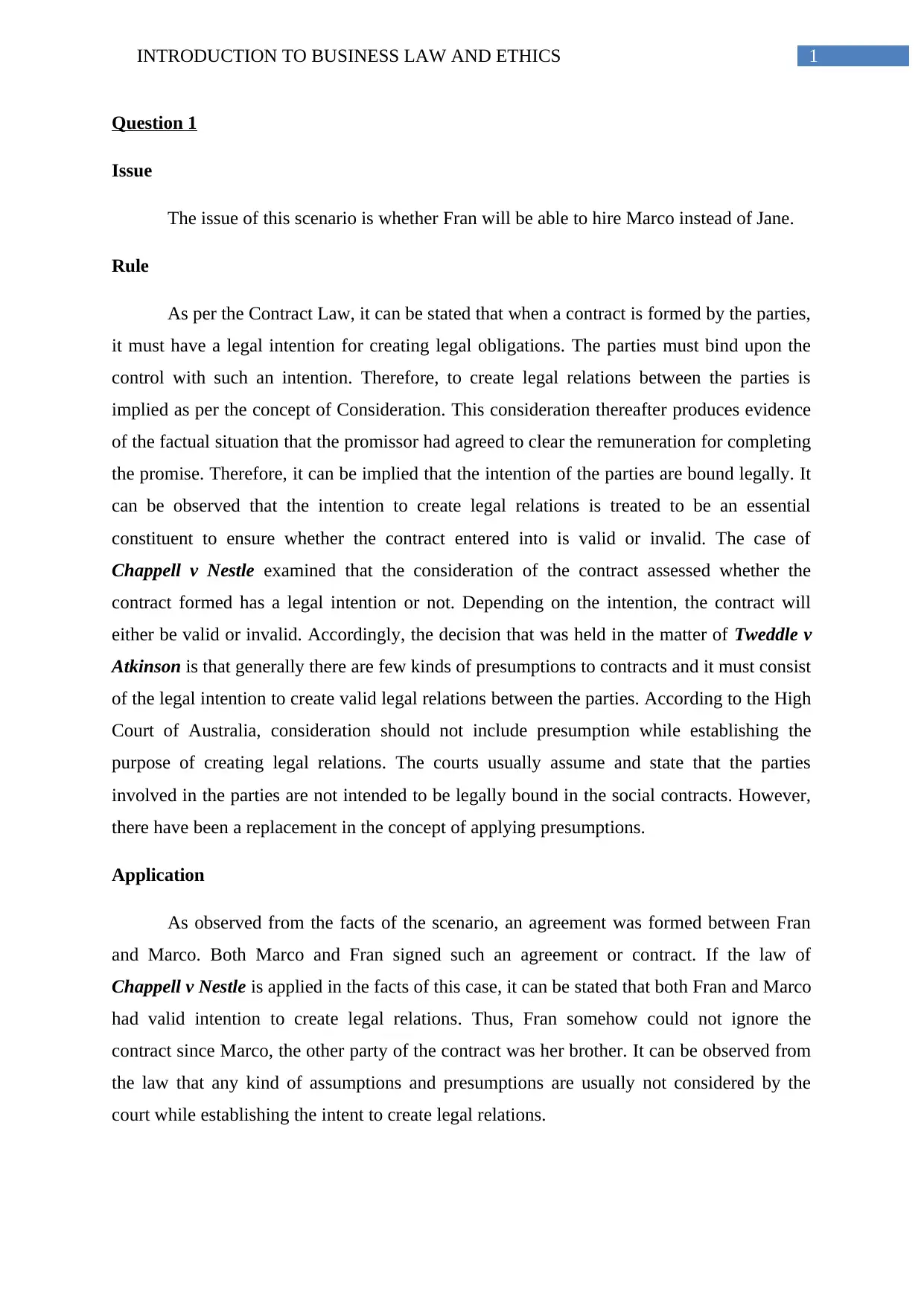
1INTRODUCTION TO BUSINESS LAW AND ETHICS
Question 1
Issue
The issue of this scenario is whether Fran will be able to hire Marco instead of Jane.
Rule
As per the Contract Law, it can be stated that when a contract is formed by the parties,
it must have a legal intention for creating legal obligations. The parties must bind upon the
control with such an intention. Therefore, to create legal relations between the parties is
implied as per the concept of Consideration. This consideration thereafter produces evidence
of the factual situation that the promissor had agreed to clear the remuneration for completing
the promise. Therefore, it can be implied that the intention of the parties are bound legally. It
can be observed that the intention to create legal relations is treated to be an essential
constituent to ensure whether the contract entered into is valid or invalid. The case of
Chappell v Nestle examined that the consideration of the contract assessed whether the
contract formed has a legal intention or not. Depending on the intention, the contract will
either be valid or invalid. Accordingly, the decision that was held in the matter of Tweddle v
Atkinson is that generally there are few kinds of presumptions to contracts and it must consist
of the legal intention to create valid legal relations between the parties. According to the High
Court of Australia, consideration should not include presumption while establishing the
purpose of creating legal relations. The courts usually assume and state that the parties
involved in the parties are not intended to be legally bound in the social contracts. However,
there have been a replacement in the concept of applying presumptions.
Application
As observed from the facts of the scenario, an agreement was formed between Fran
and Marco. Both Marco and Fran signed such an agreement or contract. If the law of
Chappell v Nestle is applied in the facts of this case, it can be stated that both Fran and Marco
had valid intention to create legal relations. Thus, Fran somehow could not ignore the
contract since Marco, the other party of the contract was her brother. It can be observed from
the law that any kind of assumptions and presumptions are usually not considered by the
court while establishing the intent to create legal relations.
Question 1
Issue
The issue of this scenario is whether Fran will be able to hire Marco instead of Jane.
Rule
As per the Contract Law, it can be stated that when a contract is formed by the parties,
it must have a legal intention for creating legal obligations. The parties must bind upon the
control with such an intention. Therefore, to create legal relations between the parties is
implied as per the concept of Consideration. This consideration thereafter produces evidence
of the factual situation that the promissor had agreed to clear the remuneration for completing
the promise. Therefore, it can be implied that the intention of the parties are bound legally. It
can be observed that the intention to create legal relations is treated to be an essential
constituent to ensure whether the contract entered into is valid or invalid. The case of
Chappell v Nestle examined that the consideration of the contract assessed whether the
contract formed has a legal intention or not. Depending on the intention, the contract will
either be valid or invalid. Accordingly, the decision that was held in the matter of Tweddle v
Atkinson is that generally there are few kinds of presumptions to contracts and it must consist
of the legal intention to create valid legal relations between the parties. According to the High
Court of Australia, consideration should not include presumption while establishing the
purpose of creating legal relations. The courts usually assume and state that the parties
involved in the parties are not intended to be legally bound in the social contracts. However,
there have been a replacement in the concept of applying presumptions.
Application
As observed from the facts of the scenario, an agreement was formed between Fran
and Marco. Both Marco and Fran signed such an agreement or contract. If the law of
Chappell v Nestle is applied in the facts of this case, it can be stated that both Fran and Marco
had valid intention to create legal relations. Thus, Fran somehow could not ignore the
contract since Marco, the other party of the contract was her brother. It can be observed from
the law that any kind of assumptions and presumptions are usually not considered by the
court while establishing the intent to create legal relations.
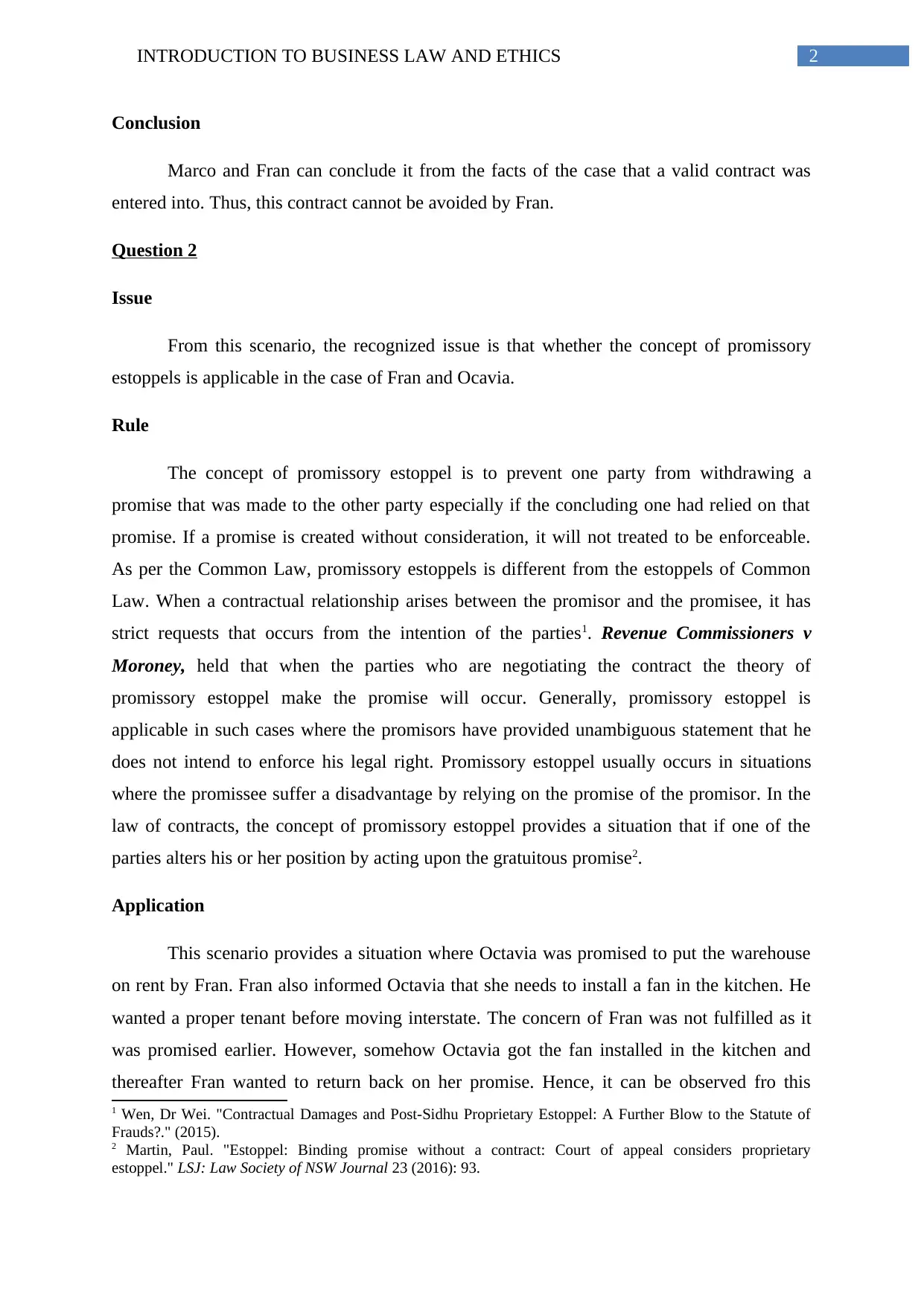
2INTRODUCTION TO BUSINESS LAW AND ETHICS
Conclusion
Marco and Fran can conclude it from the facts of the case that a valid contract was
entered into. Thus, this contract cannot be avoided by Fran.
Question 2
Issue
From this scenario, the recognized issue is that whether the concept of promissory
estoppels is applicable in the case of Fran and Ocavia.
Rule
The concept of promissory estoppel is to prevent one party from withdrawing a
promise that was made to the other party especially if the concluding one had relied on that
promise. If a promise is created without consideration, it will not treated to be enforceable.
As per the Common Law, promissory estoppels is different from the estoppels of Common
Law. When a contractual relationship arises between the promisor and the promisee, it has
strict requests that occurs from the intention of the parties1. Revenue Commissioners v
Moroney, held that when the parties who are negotiating the contract the theory of
promissory estoppel make the promise will occur. Generally, promissory estoppel is
applicable in such cases where the promisors have provided unambiguous statement that he
does not intend to enforce his legal right. Promissory estoppel usually occurs in situations
where the promissee suffer a disadvantage by relying on the promise of the promisor. In the
law of contracts, the concept of promissory estoppel provides a situation that if one of the
parties alters his or her position by acting upon the gratuitous promise2.
Application
This scenario provides a situation where Octavia was promised to put the warehouse
on rent by Fran. Fran also informed Octavia that she needs to install a fan in the kitchen. He
wanted a proper tenant before moving interstate. The concern of Fran was not fulfilled as it
was promised earlier. However, somehow Octavia got the fan installed in the kitchen and
thereafter Fran wanted to return back on her promise. Hence, it can be observed fro this
1 Wen, Dr Wei. "Contractual Damages and Post-Sidhu Proprietary Estoppel: A Further Blow to the Statute of
Frauds?." (2015).
2 Martin, Paul. "Estoppel: Binding promise without a contract: Court of appeal considers proprietary
estoppel." LSJ: Law Society of NSW Journal 23 (2016): 93.
Conclusion
Marco and Fran can conclude it from the facts of the case that a valid contract was
entered into. Thus, this contract cannot be avoided by Fran.
Question 2
Issue
From this scenario, the recognized issue is that whether the concept of promissory
estoppels is applicable in the case of Fran and Ocavia.
Rule
The concept of promissory estoppel is to prevent one party from withdrawing a
promise that was made to the other party especially if the concluding one had relied on that
promise. If a promise is created without consideration, it will not treated to be enforceable.
As per the Common Law, promissory estoppels is different from the estoppels of Common
Law. When a contractual relationship arises between the promisor and the promisee, it has
strict requests that occurs from the intention of the parties1. Revenue Commissioners v
Moroney, held that when the parties who are negotiating the contract the theory of
promissory estoppel make the promise will occur. Generally, promissory estoppel is
applicable in such cases where the promisors have provided unambiguous statement that he
does not intend to enforce his legal right. Promissory estoppel usually occurs in situations
where the promissee suffer a disadvantage by relying on the promise of the promisor. In the
law of contracts, the concept of promissory estoppel provides a situation that if one of the
parties alters his or her position by acting upon the gratuitous promise2.
Application
This scenario provides a situation where Octavia was promised to put the warehouse
on rent by Fran. Fran also informed Octavia that she needs to install a fan in the kitchen. He
wanted a proper tenant before moving interstate. The concern of Fran was not fulfilled as it
was promised earlier. However, somehow Octavia got the fan installed in the kitchen and
thereafter Fran wanted to return back on her promise. Hence, it can be observed fro this
1 Wen, Dr Wei. "Contractual Damages and Post-Sidhu Proprietary Estoppel: A Further Blow to the Statute of
Frauds?." (2015).
2 Martin, Paul. "Estoppel: Binding promise without a contract: Court of appeal considers proprietary
estoppel." LSJ: Law Society of NSW Journal 23 (2016): 93.
⊘ This is a preview!⊘
Do you want full access?
Subscribe today to unlock all pages.

Trusted by 1+ million students worldwide
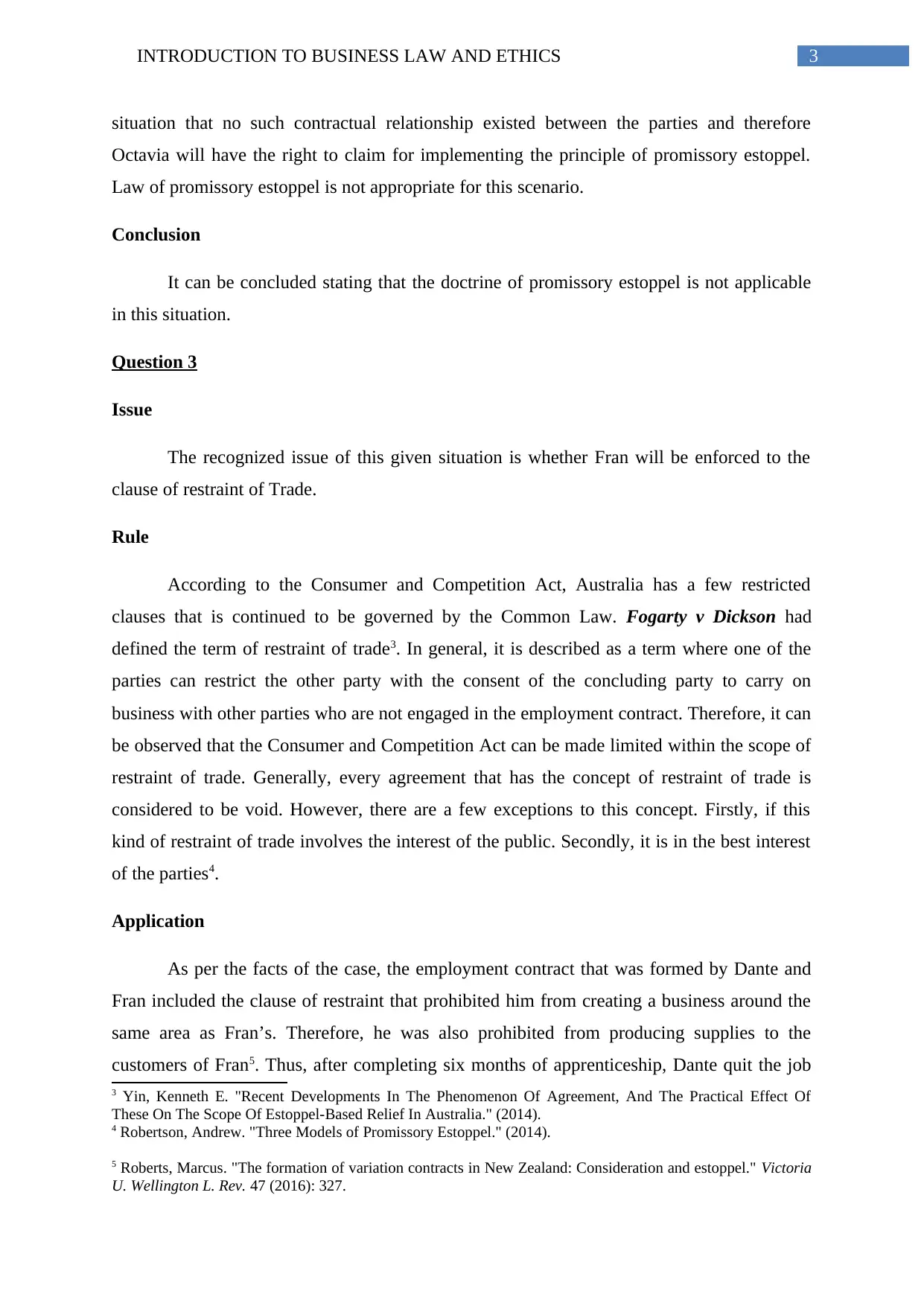
3INTRODUCTION TO BUSINESS LAW AND ETHICS
situation that no such contractual relationship existed between the parties and therefore
Octavia will have the right to claim for implementing the principle of promissory estoppel.
Law of promissory estoppel is not appropriate for this scenario.
Conclusion
It can be concluded stating that the doctrine of promissory estoppel is not applicable
in this situation.
Question 3
Issue
The recognized issue of this given situation is whether Fran will be enforced to the
clause of restraint of Trade.
Rule
According to the Consumer and Competition Act, Australia has a few restricted
clauses that is continued to be governed by the Common Law. Fogarty v Dickson had
defined the term of restraint of trade3. In general, it is described as a term where one of the
parties can restrict the other party with the consent of the concluding party to carry on
business with other parties who are not engaged in the employment contract. Therefore, it can
be observed that the Consumer and Competition Act can be made limited within the scope of
restraint of trade. Generally, every agreement that has the concept of restraint of trade is
considered to be void. However, there are a few exceptions to this concept. Firstly, if this
kind of restraint of trade involves the interest of the public. Secondly, it is in the best interest
of the parties4.
Application
As per the facts of the case, the employment contract that was formed by Dante and
Fran included the clause of restraint that prohibited him from creating a business around the
same area as Fran’s. Therefore, he was also prohibited from producing supplies to the
customers of Fran5. Thus, after completing six months of apprenticeship, Dante quit the job
3 Yin, Kenneth E. "Recent Developments In The Phenomenon Of Agreement, And The Practical Effect Of
These On The Scope Of Estoppel-Based Relief In Australia." (2014).
4 Robertson, Andrew. "Three Models of Promissory Estoppel." (2014).
5 Roberts, Marcus. "The formation of variation contracts in New Zealand: Consideration and estoppel." Victoria
U. Wellington L. Rev. 47 (2016): 327.
situation that no such contractual relationship existed between the parties and therefore
Octavia will have the right to claim for implementing the principle of promissory estoppel.
Law of promissory estoppel is not appropriate for this scenario.
Conclusion
It can be concluded stating that the doctrine of promissory estoppel is not applicable
in this situation.
Question 3
Issue
The recognized issue of this given situation is whether Fran will be enforced to the
clause of restraint of Trade.
Rule
According to the Consumer and Competition Act, Australia has a few restricted
clauses that is continued to be governed by the Common Law. Fogarty v Dickson had
defined the term of restraint of trade3. In general, it is described as a term where one of the
parties can restrict the other party with the consent of the concluding party to carry on
business with other parties who are not engaged in the employment contract. Therefore, it can
be observed that the Consumer and Competition Act can be made limited within the scope of
restraint of trade. Generally, every agreement that has the concept of restraint of trade is
considered to be void. However, there are a few exceptions to this concept. Firstly, if this
kind of restraint of trade involves the interest of the public. Secondly, it is in the best interest
of the parties4.
Application
As per the facts of the case, the employment contract that was formed by Dante and
Fran included the clause of restraint that prohibited him from creating a business around the
same area as Fran’s. Therefore, he was also prohibited from producing supplies to the
customers of Fran5. Thus, after completing six months of apprenticeship, Dante quit the job
3 Yin, Kenneth E. "Recent Developments In The Phenomenon Of Agreement, And The Practical Effect Of
These On The Scope Of Estoppel-Based Relief In Australia." (2014).
4 Robertson, Andrew. "Three Models of Promissory Estoppel." (2014).
5 Roberts, Marcus. "The formation of variation contracts in New Zealand: Consideration and estoppel." Victoria
U. Wellington L. Rev. 47 (2016): 327.
Paraphrase This Document
Need a fresh take? Get an instant paraphrase of this document with our AI Paraphraser
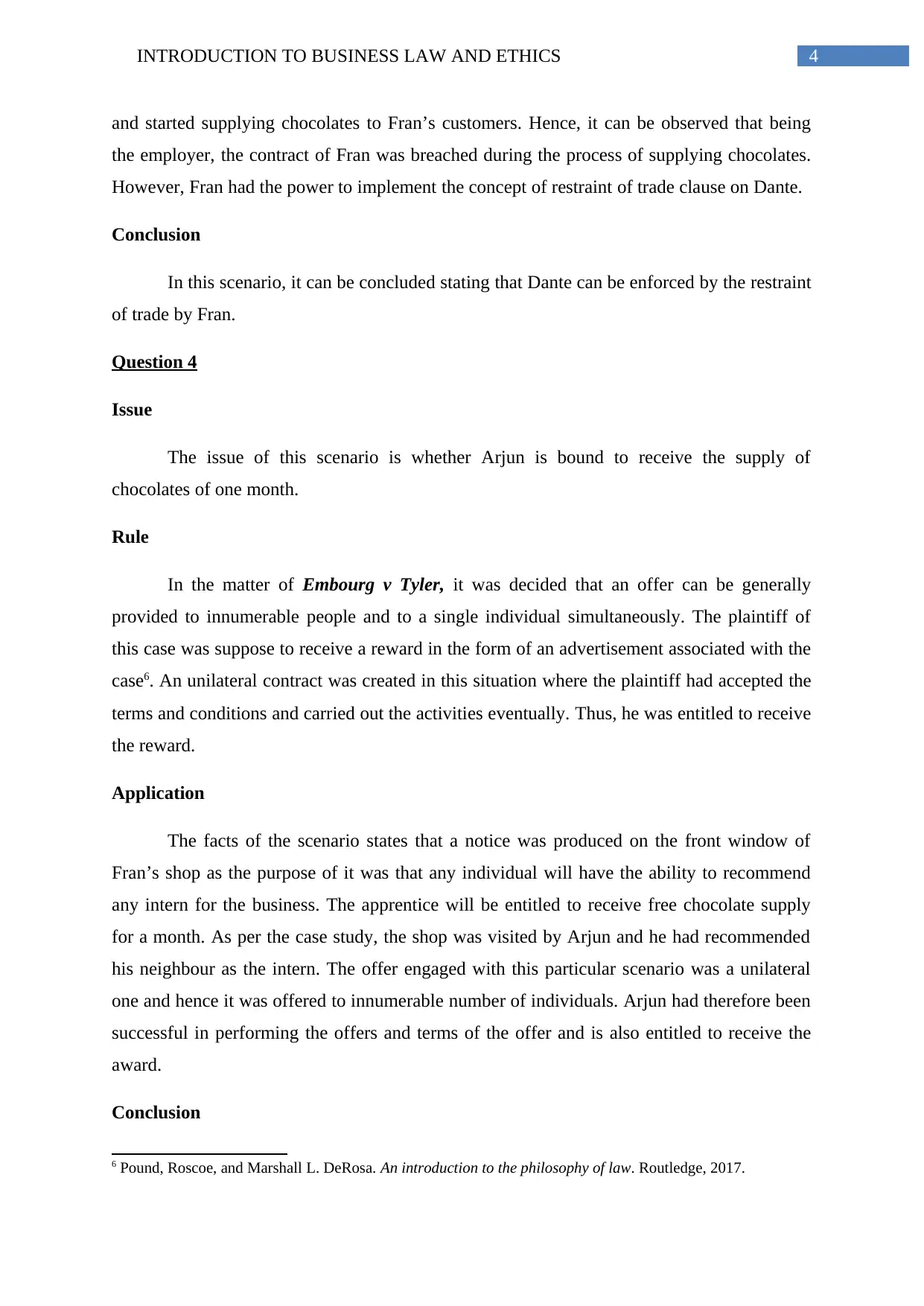
4INTRODUCTION TO BUSINESS LAW AND ETHICS
and started supplying chocolates to Fran’s customers. Hence, it can be observed that being
the employer, the contract of Fran was breached during the process of supplying chocolates.
However, Fran had the power to implement the concept of restraint of trade clause on Dante.
Conclusion
In this scenario, it can be concluded stating that Dante can be enforced by the restraint
of trade by Fran.
Question 4
Issue
The issue of this scenario is whether Arjun is bound to receive the supply of
chocolates of one month.
Rule
In the matter of Embourg v Tyler, it was decided that an offer can be generally
provided to innumerable people and to a single individual simultaneously. The plaintiff of
this case was suppose to receive a reward in the form of an advertisement associated with the
case6. An unilateral contract was created in this situation where the plaintiff had accepted the
terms and conditions and carried out the activities eventually. Thus, he was entitled to receive
the reward.
Application
The facts of the scenario states that a notice was produced on the front window of
Fran’s shop as the purpose of it was that any individual will have the ability to recommend
any intern for the business. The apprentice will be entitled to receive free chocolate supply
for a month. As per the case study, the shop was visited by Arjun and he had recommended
his neighbour as the intern. The offer engaged with this particular scenario was a unilateral
one and hence it was offered to innumerable number of individuals. Arjun had therefore been
successful in performing the offers and terms of the offer and is also entitled to receive the
award.
Conclusion
6 Pound, Roscoe, and Marshall L. DeRosa. An introduction to the philosophy of law. Routledge, 2017.
and started supplying chocolates to Fran’s customers. Hence, it can be observed that being
the employer, the contract of Fran was breached during the process of supplying chocolates.
However, Fran had the power to implement the concept of restraint of trade clause on Dante.
Conclusion
In this scenario, it can be concluded stating that Dante can be enforced by the restraint
of trade by Fran.
Question 4
Issue
The issue of this scenario is whether Arjun is bound to receive the supply of
chocolates of one month.
Rule
In the matter of Embourg v Tyler, it was decided that an offer can be generally
provided to innumerable people and to a single individual simultaneously. The plaintiff of
this case was suppose to receive a reward in the form of an advertisement associated with the
case6. An unilateral contract was created in this situation where the plaintiff had accepted the
terms and conditions and carried out the activities eventually. Thus, he was entitled to receive
the reward.
Application
The facts of the scenario states that a notice was produced on the front window of
Fran’s shop as the purpose of it was that any individual will have the ability to recommend
any intern for the business. The apprentice will be entitled to receive free chocolate supply
for a month. As per the case study, the shop was visited by Arjun and he had recommended
his neighbour as the intern. The offer engaged with this particular scenario was a unilateral
one and hence it was offered to innumerable number of individuals. Arjun had therefore been
successful in performing the offers and terms of the offer and is also entitled to receive the
award.
Conclusion
6 Pound, Roscoe, and Marshall L. DeRosa. An introduction to the philosophy of law. Routledge, 2017.

5INTRODUCTION TO BUSINESS LAW AND ETHICS
By reviewing the law and the facts, it can be concluded stating that Arjun will be
entitled to obtain a supply of free chocolate for a period of one month.
By reviewing the law and the facts, it can be concluded stating that Arjun will be
entitled to obtain a supply of free chocolate for a period of one month.
⊘ This is a preview!⊘
Do you want full access?
Subscribe today to unlock all pages.

Trusted by 1+ million students worldwide

6INTRODUCTION TO BUSINESS LAW AND ETHICS
Bibliography
Goldberger, Jeffrey. "Estoppel and contract." Commercial Law Quarterly: The Journal of the
Commercial Law Association of Australia 29.3 (2015): 16.
Jackson, Lucy. "Towards an administrative estoppel." AIAL Forum. No. 81. Australian
Institute of Administrative Law, 2015.
Martin, Paul. "Estoppel: Binding promise without a contract: Court of appeal considers
proprietary estoppel." LSJ: Law Society of NSW Journal 23 (2016): 93.
Pound, Roscoe, and Marshall L. DeRosa. An introduction to the philosophy of law.
Routledge, 2017.
Roberts, Marcus. "The formation of variation contracts in New Zealand: Consideration and
estoppel." Victoria U. Wellington L. Rev. 47 (2016): 327.
Roberts, Marcus. "Variation contracts in Australia and New Zealand: whither
consideration?." Oxford University Commonwealth Law Journal 17.2 (2017): 238-264.
Robertson, Andrew. "Three Models of Promissory Estoppel." (2014).
Wen, Dr Wei. "Contractual Damages and Post-Sidhu Proprietary Estoppel: A Further Blow
to the Statute of Frauds?." (2015).
Yin, Kenneth E. "Recent Developments In The Phenomenon Of Agreement, And The
Practical Effect Of These On The Scope Of Estoppel-Based Relief In Australia." (2014).
Bibliography
Goldberger, Jeffrey. "Estoppel and contract." Commercial Law Quarterly: The Journal of the
Commercial Law Association of Australia 29.3 (2015): 16.
Jackson, Lucy. "Towards an administrative estoppel." AIAL Forum. No. 81. Australian
Institute of Administrative Law, 2015.
Martin, Paul. "Estoppel: Binding promise without a contract: Court of appeal considers
proprietary estoppel." LSJ: Law Society of NSW Journal 23 (2016): 93.
Pound, Roscoe, and Marshall L. DeRosa. An introduction to the philosophy of law.
Routledge, 2017.
Roberts, Marcus. "The formation of variation contracts in New Zealand: Consideration and
estoppel." Victoria U. Wellington L. Rev. 47 (2016): 327.
Roberts, Marcus. "Variation contracts in Australia and New Zealand: whither
consideration?." Oxford University Commonwealth Law Journal 17.2 (2017): 238-264.
Robertson, Andrew. "Three Models of Promissory Estoppel." (2014).
Wen, Dr Wei. "Contractual Damages and Post-Sidhu Proprietary Estoppel: A Further Blow
to the Statute of Frauds?." (2015).
Yin, Kenneth E. "Recent Developments In The Phenomenon Of Agreement, And The
Practical Effect Of These On The Scope Of Estoppel-Based Relief In Australia." (2014).
1 out of 7
Related Documents
Your All-in-One AI-Powered Toolkit for Academic Success.
+13062052269
info@desklib.com
Available 24*7 on WhatsApp / Email
![[object Object]](/_next/static/media/star-bottom.7253800d.svg)
Unlock your academic potential
Copyright © 2020–2026 A2Z Services. All Rights Reserved. Developed and managed by ZUCOL.

